
Talking to children about COVID-19 helps them feel safe and secure
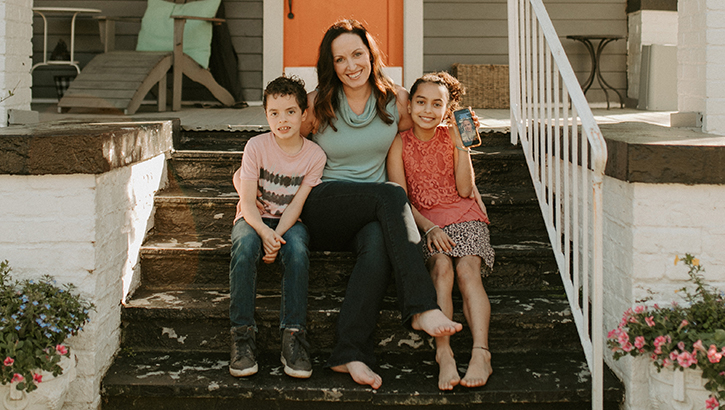
Kellie Artis at her home near Fort Bragg, North Carolina, with Rhys and Hannah. (Photo courtesy Avery Lynn Photography)
Military spouse Kellie Artis talked with her children about COVID-19 and how to stop the highly contagious respiratory illness from spreading. Afterward, they seemed untroubled. Ten-year-old Hannah and 8-year-old Rhys stopped asking to have friends over, and to visit the playground across the street from their home near Fort Bragg, North Carolina. They didn't complain about the restrictions during video chats with their dad, a Special Forces officer who's deployed overseas.
But then one night, Artis heard Rhys crying in his bedroom. When she asked him what was wrong, he sobbed, "I don't like the coronavirus!" He'd overheard his mom talking on the phone with another military spouse. They were discussing further measures that might be enacted. Artis had used the word "lockdown," and the term had scared Rhys.
"They're owed an explanation" about why their lives have changed so unexpectedly, Artis said. "But I'm trying to balance shielding them from too much information while also making sure they're safe."
Now more than ever, open communication is critical to helping children of all ages feel safe and secure, said Dr. Stephen Cozza. The retired Army colonel is also senior scientist at Uniformed Services University's Center for the Study of Traumatic Stress, or CSTS.
But it can be difficult talking with children about COVID-19, Cozza said. The situation changes from day to day, and parents themselves are trying to keep up.
"We want to share," said Cozza, who's also a psychiatry professor at USU. "But at the same time, we want to protect our kids and not worry them. When we can stay calm and clear with our children, it helps them to remain calm and better understand what's happening."
In uncertain times, children in military families may have advantages, Cozza said. They include a strong sense of community – "we're all in this together" – and pride that their family members are counted as helpers who sustain the well-being of the country.
But military kids also may feel a responsibility greater than their years, Cozza said, particularly if their parent is deployed. Dealing with a pandemic can be an "added challenge for families as well as children."
Cozza said parents should offer age-appropriate messages to explain what's happening. So for younger kids, he said, it can be something as simple as, “Coronavirus is a new germ. Germs can spread from one person to another and make them sick. That's why we wash our hands.”
Artis said she described maintaining 6-foot physical distance to her kids as "keeping llama space." They'd recently seen the animals up close at a birthday party, and could easily picture the length of one.
She also told her kids about people planting victory gardens during World War II as a way to support the soldiers fighting overseas.
"I explained that they did their part, and now it's time to do our part," she said. "We can't see what we're fighting, but it still matters. And I told them we're doing it here for other kids' grandmas and grandpas, just like the people in Grandma and Grandpa's neighborhood are doing it for them."
Cozza said that with older kids, who may be getting inaccurate information on social media, "We need to help them understand what they see and hear. So maybe you start the conversation with, 'What have you heard about COVID-19, and what questions do you have?'"
He added that children of all ages should be assured that while COVID-19 is serious, there's no need to panic. Also, most people who do get sick will get better. And it's OK to express fears and ask questions.
Still, doing everything right doesn't mean there won't be a hiccup or two, as Artis learned.
"I certainly go through waves of anxiety," she said. "But I think we've adapted pretty easily – especially with the idea of not having an end date because that's how a lot of military families live our lives. There seems to never be an end date."
Cozza advises parents to be empathetic while still enforcing expectations. "You can say something like, 'I know this is a really tough time, and you miss our friends. But I really do need your help. And we're going to work together to get through this.'"
The CSTS has produced two fact sheets for parents: "Discussing Coronavirus with Your Children" and "Finding the Right Words to Talk with Children and Teens About Coronavirus."
Other resources related to COVID-19 can be found on the CSTS website.
Defense Health Official Urges Personnel, Families to Wear Face Masks
Article
4/8/2020
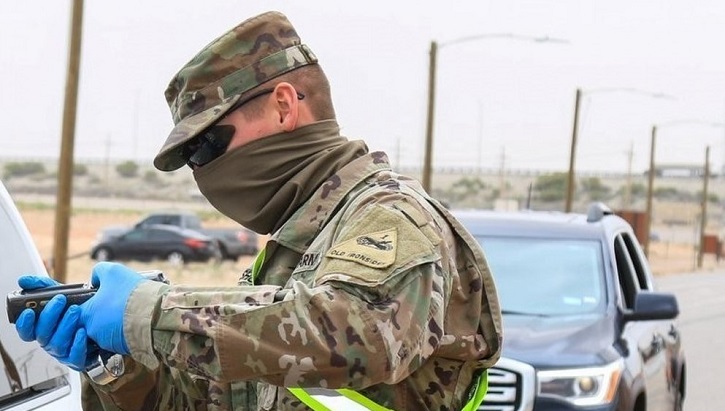
The face-covering mask can be fashioned from simple household items.
Joint Staff Surgeon Praises Americans Stepping Up to Help COVID-19 Victims
Article
4/7/2020
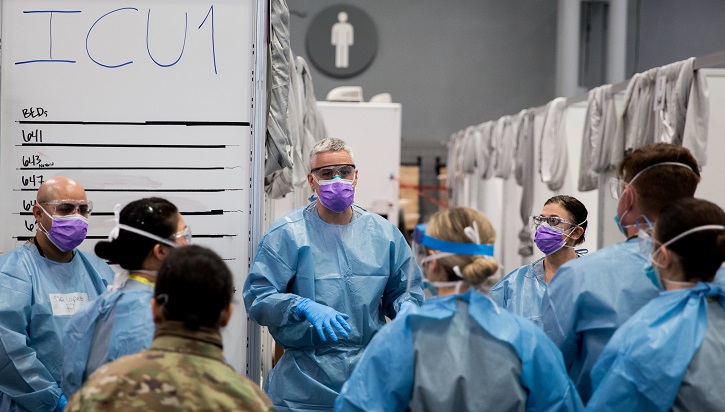
It's about people helping people, flattening the curve, and slowing the spread of the pandemic so hospitals have a bit more time to prepare.
VENDOR UNSOLICITED PROPOSAL IN SUPPORT OF COVID-19
Form/Template
4/7/2020
Unsolicited Proposal Information Supporting COVID-19
New York City emergency room doc joins Air National Guard as flight surgeon
Article
4/6/2020
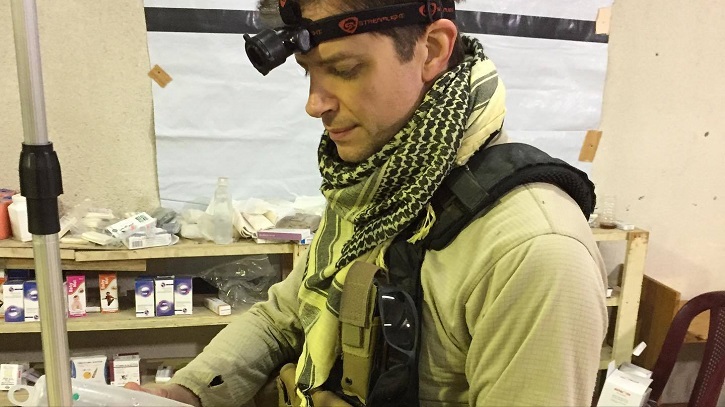
Paladino is Associate Professor of Emergency Medicine at SUNY Downstate Medical Center and also at Kings County Hospital Center.
DoD Guidance on the Use of Cloth Face Coverings
Publication
4/5/2020
Effective immediately, to the extent practical, all individuals on DoD property, installations, and facilities will wear cloth face coverings when they cannot maintain six feet of social distance in public areas or work centers (this does not include in a Service member's or Service family member's personal residence on a military installation).
Policy on Accessions and Accessions Training during the COVID-19 Outbreak
Publication
4/3/2020
The Military Departments must seek ways to maximize accessions in a responsible manner to minimize a reduction in military end strength and the potential deterioration of mid-and long-term readiness and capacity.
It’s complicated: Our relationship with social media
Article
4/3/2020
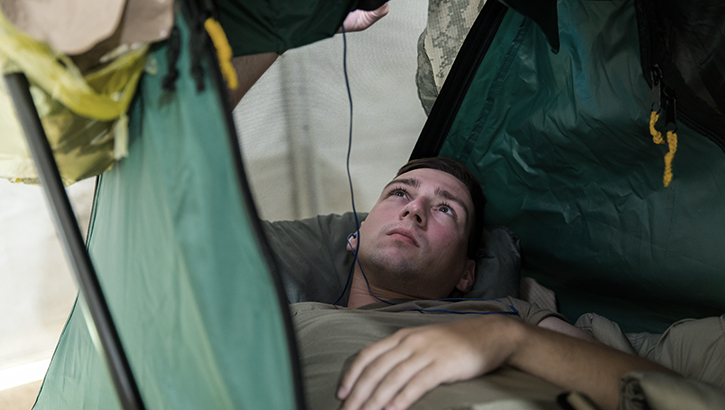
COVID-related story on perils of social media
250-patient Army field hospital in Seattle expected to open next week
Article
4/3/2020
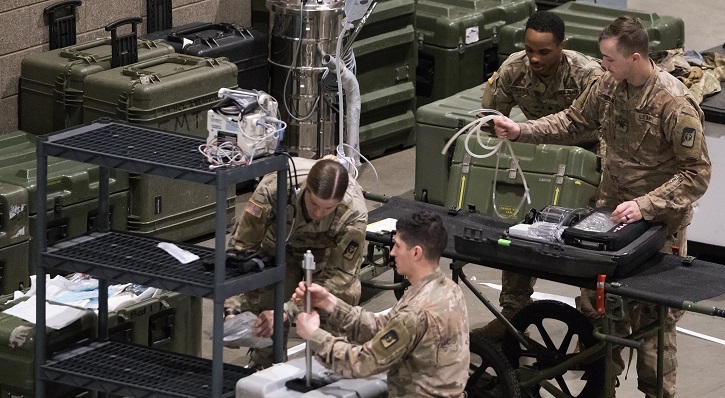
The field hospital...will relieve some of the burden on local hospitals, allowing them "freedom of maneuver" to better take care of patients who have COVID-19
Navy secretary visits hospital ship Mercy in Port of Los Angeles
Article
4/2/2020
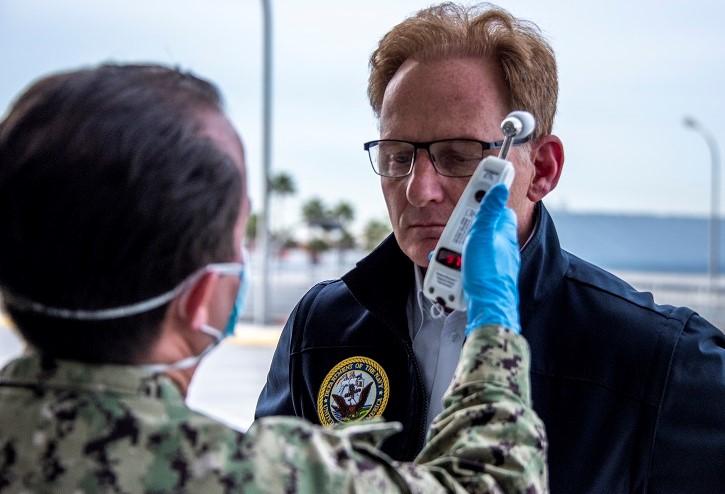
Mercy deployed in support of the nation’s COVID-19 response efforts, and will serve as a referral hospital for non-COVID-19 patients currently admitted to shore-based hospitals.
Transition of Military Medical Treatment Facilities from Military Departments to the Defense Health Agency during the COVID-19 Response
Publication
4/2/2020
The Department's MTF transition plan is conditions-based. While the transition of MTFs to DHA is continuing, the COVID-19 response requirements are impacting DHA's ability to meet all required conditions. The need for the DHA and MILDEPs to refocus efforts away from the transition to support the COVID-19 response led to questions regarding the future of MTF Transition.
Exemption - Stop Movement for Travel for DoD Components in Response to COVID-19
Publication
4/1/2020
DoD personnel supporting presidential support duties are exempt from the "Stop Movement for Travel" directive
From the front lines to the home front, Military Medicine is always ready
Article
4/1/2020
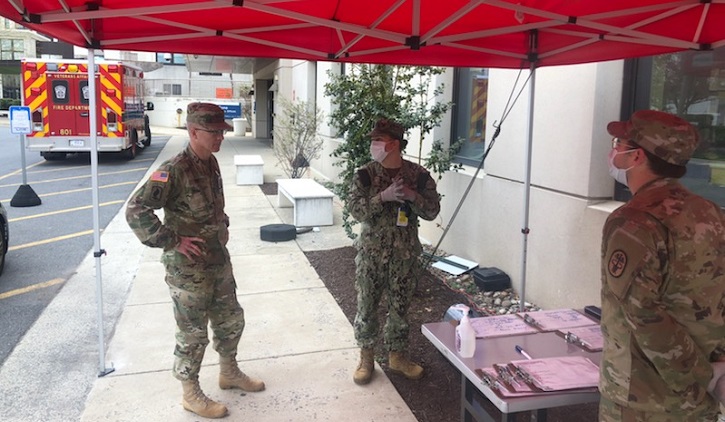
Military medicine is providing assistance in unprecedented ways
Pharmacy Guidance for Market MTFs
Publication
3/31/2020
Message to Pharmacy Beneficiaries regarding military pharmacy services during the COVID-19 pandemic.
Tiered Telehealth Health Care Support for COVID-19
Publication
3/31/2020
This memorandum establishes guidance for the use of Telehealth (TH) Information Technology (IT) tools in support of the clinical care required for patients across the spectrum of COVID-19 illness
Possible changes at MTF pharmacies in response to COVID-19
Article
3/31/2020
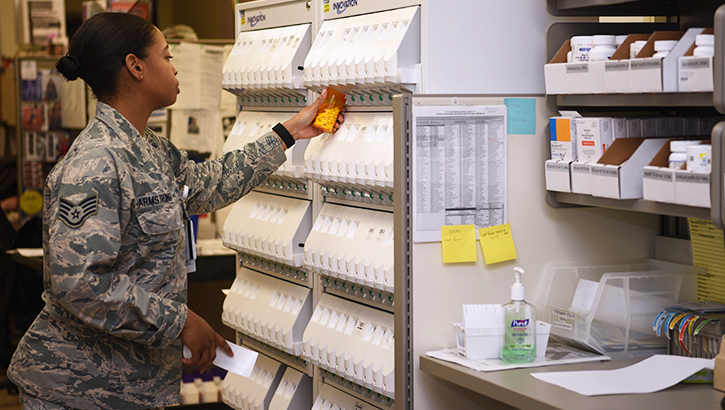
Find out the latest pharmacy policies at MTFs





















.png)












No hay comentarios:
Publicar un comentario